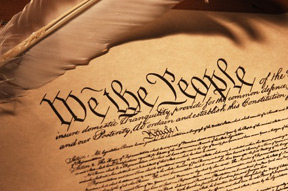民主不是自由
国内对民主与自由的关系有深而广的误解。我在这个话题上发表过的介绍性文章包括:
我认为,除非每一个参与者都先有了自己的被明确界定和受到高度尊重的产权,然后又自愿把它们交给“多数人原则”处置,否则在其他任何情况下的民主,都是对个人权利的侵犯。
在《独立宣言》和《美国宪法》里没有“民主”二字。这绝不是偶然的。美国的开国者们对“民主”怀有极大的戒心。针对最近《内地可以向香港学什么》(见这里)惹来的争议,让我引几段,然后说几句,合起来算作回应。
John Adams(《独立宣言》起草人之一,美国第一任副总统、第二任总统):
It is hard to say that every man has not an equal right; but admit this equal right and equal power, and an immediate revolution would ensue. In all the nations of Europe, the number of persons who have not a penny is double those who have a groat; admit all these to an equality of power, and you would soon see how the groats would be divided.[1]
中译:很难不让人们享有平等的权利;然而,一旦承认这种平等的权利和权力,革命就会接踵而来。在欧洲,身无分文的人是袋有铜板的人的两倍,一旦让他们享有平等的权力,那些铜板很快就会被分掉。
Alexis de Tocqueville(《美国的民主》作者):
I am not opposed to democracies. They may be great, they may be in accordance with the will of God, if they be free. What saddens me is, not that our society is democratic, but that the vices which we have inherited and acquired make it so difficult for us to obtain or to keep well-regulated liberty. And I know nothing so miserable as a democracy without liberty. [2]
中译:我并不反对民主政体。它们或许很了不起,或许符合上帝的意愿,如果这不需要付出代价的话。让我苦恼的,不在于我们的社会搞民主,而在于我们与生俱来的和后天习得的恶行,令我们很难保有井然有序的自由。以我看来,没有什么比缺乏自由的民主更可怕的了。
It was not want, but ideas, that brought about the great revolution; chimerical ideas on the relations between labor and capital, extravagant theories as to the degree in which the government might interfere between the workingman and the employer, doctrines of ultra-centralization which had at last persuaded large numbers that it depended on the state not only to save them from want, but to place them in easy, comfortable circumstances. [3]
中译:不是因为缺了什么,而是因为动了念头,才导致了大革命;人们凭空捏造了劳力和资本之间的关系,大胆设计了政府应该如何适当介入劳资关系的理论,炮制了主张极度集权的学说,并让许多人相信,依靠政府不仅能免于匮乏,还能过上安逸舒服的日子。
Milton Friedman(《资本主义与自由》作者):
Viewed as a means to the end of political freedom, economic arrangements are important because of their effect on the concentration or dispersion of power. The kind of economic organization that provides economic freedom directly, namely, competitive capitalism, also promotes political freedom because it separates economic power from political power and in this way enables the one to offset the other.
Historical evidence speaks with a single voice on the relation between political freedom and a free market. I know of no example in time or place of a society that has been marked by a large measure of political freedom, and that has not also used something comparable to a free market to organize the bulk of economic activity.
History suggest only that capitalism is a necessary condition for political freedom. Clearly it is not a sufficient condition. Fascist Italy and Fascist Spain, Germany at various times in the last seventy years, Japan before World Wars I and II, tsarist Russia in the decades before World War I – are all societies that cannot conceivably be described as politically free. Yet, in each, private enterprise was the dominant form of economic organization. It is therefore clearly possible to have economic arrangements that are fundamentally capitalist and political arrangements that are not free. [4]
中译:经济安排被看作是达到政治自由这一目标的手段,因为经济安排能够影响权力的集中和分散。那些能直接提供经济自由的经济组织,即竞争的资本主义,也能促进政治自由,因为它将经济权利从政治权力中分离出来,从而使得两者可以相互制衡。
历史绝无二致地表明了政治自由和经济自由之间的关系。古往今来,没有任何享有政治自由的社会是缺乏经济自由的。
历史只表明资本主义是政治自由的必要条件,而显然不是充分条件。法西斯治下的意大利和西班牙……都不是享有政治自由的社会,但都是以私有企业为主体的经济组织。因此,一个实质是资本主义、但政治并不自由的社会显然是可能的。
Walter E. Williams(美国乔治·梅森大学经济学教授及辛迪加专栏作家):
If rape is deemed immoral and a violation of an individual’s rights, then gang is no more moral or ethical. [5]
中译:如果强奸被看作是不道德的,是对个人权利的侵害,那么轮奸就不应该是比较高尚或比较有道德的。
Some might object to my calling welfare, Medicare, and farm handouts “theft” and prefer to delude themselves by calling them “income redistribution.” That being the case, might we give sanction to government-sponsored rape by renaming it “compassion redistribution”? [6]
中译:有些人恐怕不同意我把福利、公办医疗保险和农业补贴称作“盗窃”,而喜欢自欺欺人地把它们称为“收入再分配”。照那么说,我们是否也可以让政府来审批政府支持的强奸,并称之为“安慰再分配”?
How is it decided who may harm whom? In a dictatorship, it’s the dictator who decides. In a democracy, it’s mob rule. How is it decided in a free society? In a free society, the question of who may harm whom in what ways is decided through private property rights. [7]
译文:怎样断定谁可以伤害谁?在独裁体制,由独裁者决定。在民主社会,由暴民们决定。在自由社会,由私有产权决定。
High up on my list of annoyances are references to the United States as a democracy and the suggestion that Iraq should become a democracy. The word “democracy” appears in neither of our founding documents — the Declaration of Independence nor the U.S. Constitution.
Our nation’s founders had disdain for democracy and majority rule. James Madison, in Federalist Paper No. 10, said in a pure democracy, “there is nothing to check the inducement to sacrifice the weaker party or the obnoxious individual.” During the 1787 Constitutional Convention, Edmund Randolph said that “in tracing these evils to their origin every man had found it in the turbulence and follies of democracy.” … Chief Justice John Marshall added, “Between a balanced republic and a democracy, the difference is like that between order and chaos.” The founders knew that a democracy would lead to the same kind of tyranny suffered under King George III. Their vision for us was a republic. [8]
中译:最惹我生气的头几件事之一,就是听到人们说美国是个民主国家和说伊拉克应该成为一个民主国家。在我们两份立国文件——《独立宣言》和《美国宪法》——中并没有“民主”这个字。
我们国家的创始人蔑视民主和少数服从多数原则。麦迪逊在《联邦党人文集》中说,在纯粹的民主社会里,“把牺牲少数人或不得人心的人送上祭坛的冲动,不会受到任何制约。”在1787年宪法大会上,伦道夫说“这些恶行都能追溯到民主造成的骚乱和荒唐之中。”首席大法官马歇尔说“受制衡的共和与民主的差别,就像是秩序与紊乱之间的差别一样。”立国者们知道民主会导致暴政。他们追求的是共和。
Thomas Sowell(斯坦福大学胡佛研究所高级研究员):
The only time I have left a court room with more respect for the law than I had going in was in a court in Hong Kong, when it was under British colonial rule.
The case involved a Chinese laborer accused of theft, an accusation with considerable circumstantial evidence behind it. This case was presided over by a crusty old British judge, of upper-class demeanor and wearing the traditional white wig. He kept both lawyers on a short leash and let the witnesses know too that he had no tolerance for nonsense.
It would be hard to find two individuals more different in background and status than the Chinese laborer on trial and the British judge in charge of the case. Yet race and class were not destiny, despite the current dogmas of our intelligentsia. What was clear from the outset was that the judge was determined to see that this man got a fair trial – no more and no less. In the end, the laborer was acquitted. …
Democracy and freedom are too often confounded. Britain itself did not have anything close to democracy until the Reform Act of 1832. But it had freedom long before that.
The fundamentals of freedom – limited government, separation of powers, an independent judiciary, free speech, jury trials – existed in Britain for many generations before the franchise was extended to most males. The whole spirit, and many of the phrases, of the constitution of the United States derive from British law and government.
Just as freedom can exist without democracy, so democracy can crush freedom. …
Today, the confusion between freedom and democracy leads far too many Americans, including those in high places, to seek to spread democracy around the world – in complete disregard of the circumstances of the particular countries. In some respects, we may be more dangerous to our friends than to our enemies, when we pressure them to set up at least the trappings of democracy. …
The British were very wise to have given Hong Kong freedom. But they may also have been wise in not attempting to experiment with democracy, where the traditions needed for it did not exist. [9]
中译:我唯一一次从法庭出来时对法律的敬意要比进去时大的体验发生在英国殖民统治下的香港法庭。
案子涉及一个被控偷窃的中国壮工,证据还不少。审讯由一个脾气暴躁而年事已高的英国法官主持。他一副上流社会的架势,还带着传统的白色假发。他既没让双方的律师有任何借题发挥的余地,也没让证人感觉到他会容忍任何胡说八道。
一个是受审的中国壮工,一个是负责判案的英国法官,两人的背景和地位太悬殊了。但种族和阶级并不决定什么,尽管现在的知识分子都这么人云亦云。一开始就很清楚的是,法官决意要确保那人得到公平的审讯——一点也不偏,一点也不倚。最后那人被判无罪。
人们经常把民主和自由混为一谈。英国在1832年《改革法案》前,没有任何民主,但早就享有自由了。
在投票权扩展到大部分男性以前,自由的基石——有限政府、分权、独立司法、言论自由和陪审团公审——在英国就已经代代相传。美国宪法的全部精神以及许多字眼都来自英国的法律和政体。
自由不仅可以不依靠民主而存在,民主还可能摧毁自由。……
今天,由于对自由和民主的关系混淆不清,太多的美国人,包括那些位高权重的人,都在想方设法把民主传遍世界,而完全置特定的国情于不顾。从某些方面来说,当我们强迫我们的朋友好歹要装上民主的花环时,我们对他们的威胁可能甚于对敌人的威胁。
英国人明智地给了香港人自由,但他们可能也基于同样的智慧,没让香港尝试民主。那里并不具备民主所需要的传统。
民主(democracy)不等于自由(liberty),两者的差别要比鸭蛋和皮蛋的大。多数人暴政,从亚里士多德和柏拉图以来,就一直是重要话题。是一直,而不是当中某人的忽发奇想。围绕这个问题发言的学者,包括上述几位,对人性和公众情绪深思熟虑,对政治博弈高瞻远瞩。他们既不愚蠢,更非无耻。著名的《联邦党人文集》第9、10和51号,托克维尔的《美国的民主》第二卷第四部分,都是清晰的读物。
当代对民主的研究也一再确认了“民主有问题,它不仅有别于自由,而且经常与自由冲突”的主题。有两类体制。一,它里面每个人都只能产生有限的、受严密约束的外部副作用,它里面每个人都基本能且只能对自己的行为负责,种瓜得瓜,种豆得豆,自作自受。自由和法治社会属于此类。二,它里面每个人都能产生非常大外部副作用,它里面每个人都经常不对自己的行为负责,种瓜不得瓜,种豆不得豆,自作不自受,每个人的双手都插在别人腰包里,每个人的福利都依赖于别人的想法。计划经济和民主社会都属于此类。在缺乏前者的情况下大搞后者,对哪国人都不合适,对中国人当然也不例外。
历史事实也支持这种观点:从有私有产权和法治传统(传统是指代代相传的习惯)社会走向民主,与从其他社会走向民主,两者的结果往往大相径庭。二战后,许多国家纷纷走向民主,其中不少弄得一团糟。一般人会说,那是因为他们没搞真的民主。为什么不搞真的,复印机都那么便宜了?答案是:因为这样那样的原因,他们搞不来真的。噢,那什么是“这样那样的原因”?私有产权传统和法治传统是无论如何不可忽略的因素。以伊拉克为例,推翻暴政值得普天同庆,但为了政治正确而马上实施民主普选,则是作茧自缚。
我的看法:除非每一个参与者都先有了自己的被明确界定和受到高度尊重的产权,然后又自愿把它们交给“多数人原则”处置,否则在其他任何情况下的民主,都是对个人权利的侵犯。更甚的是,对一个连排队都还没学会的民族来说,对一个豪宅花园未能放心拆除围墙的国家来说,对一个不懂得对诸如“为自由而限权、为福利而问责”的言论自动产生敌意的公民思想状态来说,搞民主更容易滑向失控,大家抱成一团走入泥潭,陷下去了还不知道为什么。
注释:
[1] John Adams, Works, X, p. 267.
[2] Simpson, Memoir, Letters, and Remains of Tocqueville, II, P. 384.
[3] De Tocqueville to N. W. Senior, April 10, 1848 in Memoir, 11,90-91.
[4] Milton Friedman, Capitalism and Freedom, Chapter 1.
[5] Mark Steckbeck, See here.
[6] Walter E. Williams, “When and Under What Circumstances Should Violent Force Be Used?” See here.
[7] Walter E. Williams, “Who may harm whom?” See here.
[8] Walter E. Williams, “Conflict: The Battle Hymn of the Democracy” See here.
[9] Thomas Sowell, Barbarians Inside The Gates, p. 89.
相关阅读:





 布坎南(James M. Buchanan):需求量和价格之间的反向关系,是经济科学的核心命题,它体现了这样的预设,即人类的选择行为足够理性,以致是可以预测的。没有一个物理学家会说“水往上流”,也没有一个自重的经济学家会说“提高最低工资可以增加就业”。这种说法,要是认真地生发下去,将无异于全盘否定了经济学,使其科学含义荡然无存;要是这样,经济学家除了撰写迎合意识形态偏好的文章,就别无可为了。值得庆幸的是,只有一小撮经济学家愿意背弃两个世纪的经济学教诲;我们尚未堕落成一群随营的娼妓(详见
布坎南(James M. Buchanan):需求量和价格之间的反向关系,是经济科学的核心命题,它体现了这样的预设,即人类的选择行为足够理性,以致是可以预测的。没有一个物理学家会说“水往上流”,也没有一个自重的经济学家会说“提高最低工资可以增加就业”。这种说法,要是认真地生发下去,将无异于全盘否定了经济学,使其科学含义荡然无存;要是这样,经济学家除了撰写迎合意识形态偏好的文章,就别无可为了。值得庆幸的是,只有一小撮经济学家愿意背弃两个世纪的经济学教诲;我们尚未堕落成一群随营的娼妓(详见


给作者留言(不公开):